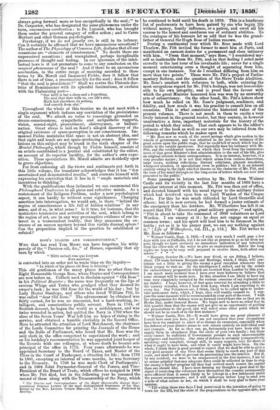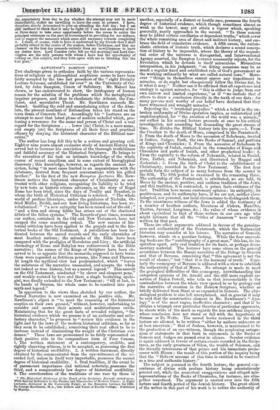ROSE'S DIARIES AND COB.RESPONDENCE. *
Wilo that has read Tom Moore can have forgotten his witty parody of the " Persicos odi, &c.," of Horace, especially that sly turn by which
" Mitte sectari rose quo locorum Sera moretur, "
is converted into an order not to waste time on the inquiry-
" In which of his places old Rose is delaying ? "
This old gentleman of the many places was no other than the Right Honourable George Rose, whose Diaries and Correspondence are now before us. Cobbett used to disclaim against "Old Rose" in his Political Register ; the name was frequently on the lips of envious Whigs and Tories who grudged what they deemed its owner's luck ; he was Old Rose for the world of his day ; but by Lady Hester Stanhope, and others who loved William Pitt, he was called "dear Old Rose." The advancement he obtained was fairly earned, for he was no sinecurist, but a hard-working, in- telligent, and conscientious public servant. Born in 1744, of Scottish descent, he began the world as a midshipman, and was twice wounded in action, but quitted the Navy in 1762 when the close of the Seven Years' War left him no hopes of rising in the service, and obtained a humble clerkship in the Record Office. Here he attracted the attention of Lord Marchmont, the chairman: of the Lords Committee for printing the Journals of the House and the Rolls of Parliament, who found that Mr. Rose was the only clerk in the office competent to superintend the work ; and on his lordship's recommendation he was appointed joint keeper of the Records with one colleague, at whose death he became sole principal of the office in 1772. Four years afterwards he was a.ppointed Secretary to the Board of Taxes, and Master of the Pleas in the Court of Exchequer, a situation for life ; from 1782 to 1801, excepting an interval of some months, he was Secretary to the Treasury. In 1788 he was made Clerk of Parliaments ; and in 1804 joint Paymaster-General of the Forces, and Vice- President of the Board of Trade, which offices he resigned in 1806 when Mr. Pitt died, but in the following year he resumed the second of them along with the Treasurership of the Navy, which
• The Diaries and Correspondence of the Right Honourable George Rose: containing Original Letters of the most distinguished Statesmen of his Day. Edited by the Bev. Levegon Vernon Harcourt. In two volumes. Published by Bentley.
he continued to hold until his death in 1818. This is a handsome list of preferments to have been gained by one who began life without money, family influence, or a patron, and owed all his success to the honest and assiduous use of ordinary abilities. To the catalogue of his honours let us add that he was the grand- father of General Sir Hugh Rose of Indian renown. During a continental tour which Mr. Rose made with Lord Thurlow, Mr. Pitt invited the former to meet him at Paris, and manifested an earnest desire for a permanent and close intimacy with him. " From that moment," says Rose, " I considered my- self as inalienable from Mr. Pitt, and on that feeling I acted most sacredly to the last hour of his invaluable life ; never for a single moment entertaining even a thought of separating from him, except in one instance. Nor do I recollect differing from him on more than two points." These were Mr. Pitt's project of Parlia- mentary Reform, and the question of the Slave Trade Abolition. Mr. Rose's conduct with reference to both, while evincing the most scrupulous regard for Mr. Pitt's feelings, was not less credit- able to his own integrity, and is proof that the favour with which the great Minister honoured him was won by no unworthy arts of subserviency. On the other hand, Mr. Pitt's letters show how much he relied on Mr. Rose's judgment, readiness, and fidelity, and how much it was his practice to consult him on all occasions. This is what constitutes the historical value of the present volumes. There is not much in them to excite a very lively interest in the general reader, but they contain, in however unattractive a form, important materials for the history of the period to which they relate. That such appears to be the editor's estimate of the book as well as our own may be inferred from the following remarks which he makes upon it.
"Mr. Rose saw so much of the secret springs which give motion to the wheels of government, and was admitted so far into the intimacy of the great actors upon the public stage' that he could tell of much which was in- visible to the outside spectators. But especially does his intimacy with Mr. Pitt, and the confidential terms on which they lived from the commence- ment of that great Minister's first administration to the end of his life, give an original interest to their correspondence. It is an interest, however, of a very peculiar nature; it is not that which arises from curious discoveries,
large views, striking reflections, literary i ' criticisms piquant anecdotes, whimpered slanders, or speculations even n politics ; but it is an interest entirely owing to the light which it throws on the character of Mr. Pitt, and the tone of his mind throughout the long series of letters which are now first presented to the public."
Some passages in letters written by Mr. Pitt from Widmer Castle and its vicinity in the last four months of 1803 have a peculiar interest at this moment. Mr. Pitt was then out of office, and. devoted. himself with his usual vigour to the military duties which had devolved upon him as Lord Warden of the Cinque Ports. For this he was much ridiculed by Lord. Grenville and. others; but it is now certain he had formed a juster estimate of the emergency than his deriders. Mr. Wilberforce has left it on record that Pitt "discovered great military genius ; " and "Pitt is about to take the command of 3000 volunteers as Lord Warden. I am uneasy at it ; he does not engage on equal or common terms ; and his spirit will lead him to be foremost in the battle ; yet as it is his proper post,we can say nothing against it." [Life of Wilberforce, vol. 11ip. 113.] Mr. Pitt writes to Mr. Rose as follows- " Walmer Castle, Sept. 8, 1803.-1 wish very much I could pass a few days with you at Cuffnells, but I do not like at present to go so far from my poet, though we have certainly no immediate indication of any intention from the other side of the water to give us employment. Before the long nights we hope to be very well prepared to receive them, both afloat and ashore." * * * "Margate, October 18.—We have now fitted, or are fitting, I believe, about 170 boats between Margate and Hastings, which, I think, will con- tribute not a little to giving the enemy a good reception whenever they think proper to visit us. By the intelligence I collect, and by the orders for extraordinary preparation which are received from London by this post, I am much more inclined than I have ever been hitherto to believe that some attempt will be made soon. In this situation lam likely to have my time very completely occupied by the various concerns of my regiment and my district. I hope, however, to find aome interval for attending a little to the 'cursory remarks, when I hear from Long, which I am expecting to do every day. Our Volunteers are I think, likely to be called upon to under- take permanent duty, which, I hope, they will readily consent to. I sup- pose the same measure will be recommended in your part of the coast. I wish the arrangements for defence were as forward everywhere else as they are in Hythe Bay, under General Moore. We begin now to have no other fear in that quarter than that the enemy will not give us an opportunity of putting our preparations to the proof, and -will select some other point which we should not be in reach of in the first instance."
"Weimer Castle, Nov. 10.—It would have given me great pleasure if I could have seen you here' but I am not surprised that your occupations have been too constant to allow of so distant an excursion, especially when the defence of your district seems to rest almost entirely on individual zeal and example. As far as they can go, fortunately you have been able to supply them in abundance from the circle of your own family ; but these alone cannot he sufficient if Government persists in such unaccountable negligence and inactivity. Our state of defence is certainly (comparatively speaking) very complete, though still, in many respects, very far short of what it ought to have been and what it easily might have been. On the whole, I think there is good ground to expect that we shall be able to give a very good account of any force that seems likely to reach any part of this coast and shall be able to prevent its penetrating into the interior. But if, by any accident, we were to be overpowered in the first instance, I am by no means satisfied that any adequate force could be collected in time to stop the enemy's further progress till they had arrived much nearer the capital than one should like. I have been turning my thoughts a good deal to the object of rendering the volunteer force throughout the country permanently more efficient than it seems likely to be (except in a few instances) under the present arrangements ; and I will endeavour before long to send you a note of what occurs to me, on which I shall be very glad to have your opinion.
"Till within these two days I had persevered in the intention of going to town for the 22d, but the state of the preparations on the opposite side, and
the uncertainty from day to day whether the attempt may not be made immediately, makes me unwilling to leave the coast at present. I have, therefore, nearly determined to give up attending the first day ; but I am still inclined to think that it may be right (if I can find an interval of two or three days) to take some opportunity before the recess to notice the principal omissions on the part of Government in providing for our defence, and to suggest the measures which seem still necessary towards completing it. I shall, of course, wish to have it understood by my friends thatI shall probably attend in the course of the session, before Christmas, and that my absence on the first day proceeds entirely from my unwillingness to leave my duties here. Lord Camden (who left me this morning) and Lord Car- rington are the only persons with whom I have had the opportunity of talking on this subject, and they both agree with me in thinking this the best plan."



























 Previous page
Previous page